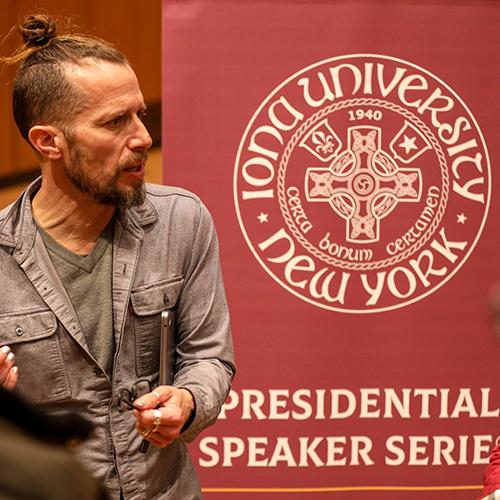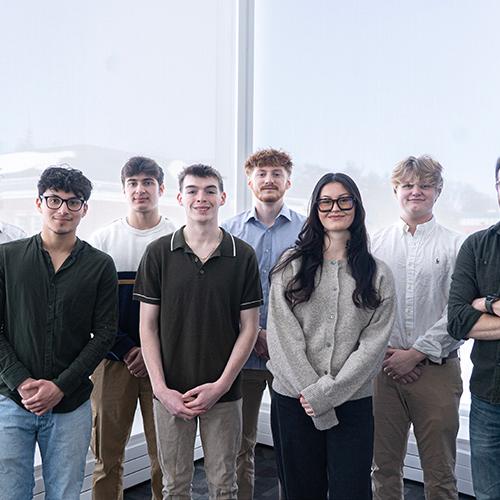Md Golam Moula Mehedi Hasan, Ph.D.
Assistant Professor of Computer Science

- Office:
- Murphy Center, Room 113E
- Email:
- mmehedihasan@iona.edu
Degrees:
- Ph.D., Computer Science, Tennessee Tech University
- MS, Computer Science, Tennessee Tech University
- MBA, Finance, IBA, DU, Bangladesh
- BS, Computer Science and Engineering, BUET, Bangladesh
Dr. Mehedi Hasan teaches a variety of undergraduate and graduate courses in computer science. His research interests are in cyber security, machine learning, and explainability in machine learning. Dr. Hasan’s recent work focuses on counterfactual explanation in machine learning models, more specifically generating targeted counterfactual examples in this regard.
Journals
- Hasan, MGMM, Rahman, MA, 2020. “A signaling game approach to mitigate co-resident attacks in an IaaS cloud environment”. Journal of Information Security and Applications 50, 102397.
- Rahman, MA, Hasan, MGMM, Manshaei, MH, Al-Shaer, E, 2020. “A game-theoretic analysis to defend against remote operating system fingerprinting”. Journal of Information Security and Applications 52, 102456.
Conferences
- Hasan, MGMM, Talbert, D, 2022. “Data Augmentation using Counterfactuals: Proximity vs Diversity”. The 35th International FLAIRS Conference.
- Hasan, MGMM, Talbert, D, 2022. “Mitigating the Rashomon Effect in Counterfactual Explanation: A Game-theoretic Approach”. The 35th International FLAIRS Conference.
- Hasan, MGMM, Talbert, D, 2021. “Counterfactual Examples for Data Augmentation: A Case Study”. The 34th International FLAIRS Conference.
- Hasan, MGMM, Rahman, MA, Manshaei, MH, Saad, W, 2019. “A Game-Theoretic Analysis of Pricing Competition between Aggregators in V2G Systems”. IEEE 43rd Annual Computer Software and Applications Conference (COMPSAC).
- Jakaria, AHM, Rahman, MA, Hasan, MGMM, 2019. “Safety Analysis of AMI Networks Through Smart Fraud Detection”. IEEE Conference on Communications and Network Security (CNS).
- Hasan, MGMM, Rahman, MA, 2018. “Chained of things: A secure and dependable design of autonomous vehicle services”. IEEE 42nd Annual Computer Software and Applications Conference (COMPSAC).
- Hasan, MGMM, Rahman, MA, 2017. “Protection by detection: A signaling game approach to mitigate coresident attacks in cloud”. IEEE 10th International Conference on Cloud Computing (CLOUD).
Posters
- Hasan, MGMM, Talbert, D, 2020. “Use Case of Counterfactual Examples: Data Augmentation”. Proceedings of Student Research and Creative Inquiry Day.
- Jakaria, AHM, Hasan, MGMM, 2019. “Smart Fraud Detection in Smart Metering System of AMI Networks”. The 14th Annual Research and Creative Inquiry Day.
- Game-theoretic Application for Cyber Security
- Application of Machine Learning for Cyber Security
- Fair ML/AI
- Explainable Artificial Intelligence
- Efficient Counterfactual Examples Generation
- Network Security
Dr. Mehedi Hasan joined Iona University as an assistant professor of Computer Science in 2022. He received his Bachelor of Science degree in Computer Science & Engineering from Bangladesh University of Engineering & Technology in March 2009. After that, he started working in the technology division of a financial organization. While working there he started his MBA program and received a Master of Business Administration degree in Finance from the Institute of Business Administration, Dhaka in December 2014. He then entered the College of Graduate Studies at Tennessee Tech University in January 2016 and received his Master of Science degree in Computer Science in December 2017. He started his Ph.D. at Tennessee Tech University in August 2018 and received his Doctor of Philosophy in Engineering in July 2022.
His research in explainability in machine learning is focused on providing feasible counterfactual explanation of machine learning models. He has previously taught several courses at Tennessee Tech University, including Introduction to Problem Solving-Computer Programming, Design of Algorithms, Unix Laboratory, and Object-Oriented Programming Design. In addition to teaching, he has served as a Vice President of Data Science League and was a member of Computer Science Student Advisory Council at Tennessee Tec University. He also worked as sub reviewer of SmartGridComm’19, ICDCN18 - PhD Forum, 4th NSysS 2017, and ISI WIC 2016.


